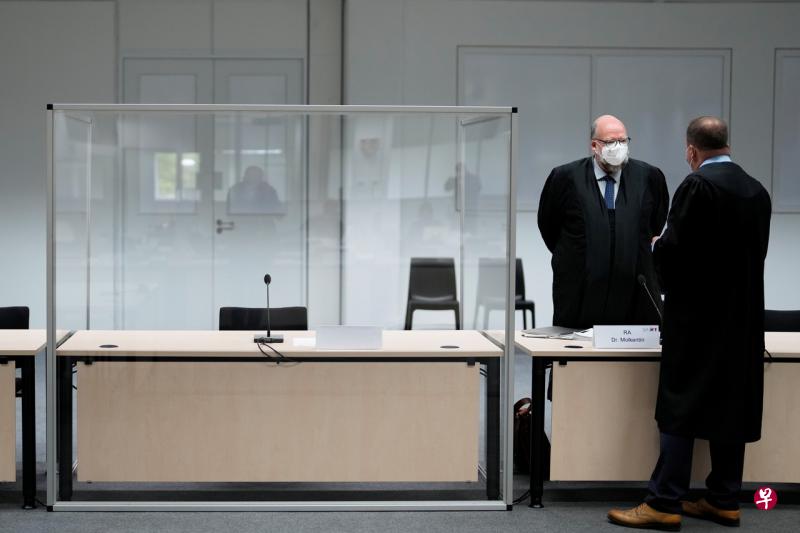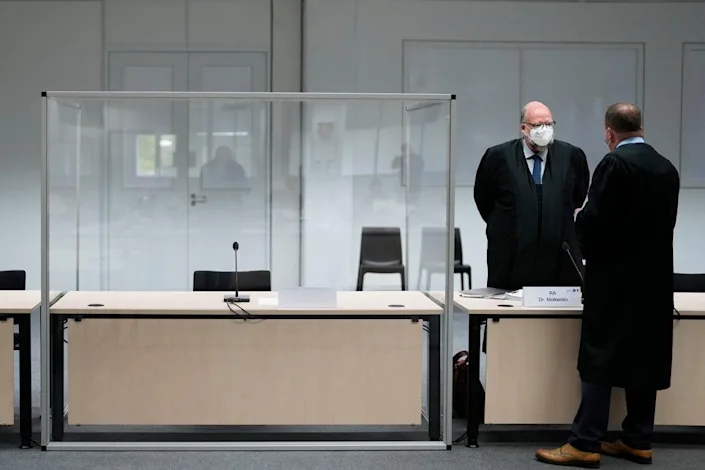德国96岁前纳粹集中营秘书以共谋屠杀嫌疑受审
文 / 林煇智
9/30/2021

(早报讯)德国法院周四(30日)以共谋屠杀嫌疑,对一名现年96岁妇女进行审判。她被指控在波兰境内的施图特霍夫(Stutthof)集中营担任秘书期间参与共谋屠杀了超过1万1000人。
新华社引述北德意志广播电台报道,这名被告人名为伊姆加德,她于1943年6月到1945年4月间在施图特霍夫集中营担任集中营长官的秘书兼速记员。
根据德国法律,由于被告在集中营工作之初刚刚年满18岁,所以此案由石勒苏益格-荷尔斯泰因(Landgericht Itzehoe)州法院青少年法庭审理。被告目前生活在养老院,已经以身体健康原因为由,委托律师代表自己出庭。
据报道,这是德国首次对纳粹集中营秘书展开司法审判。检方称,二战期间共有约6万5000人在施图特霍夫集中营被屠杀,死者主要是犹太人、波兰游击队员和苏军战俘。
Former Nazi concentration camp secretary, 96, caught after fleeing trial
By Erik Kirschbaum
9/30/2021

A 96-year-old German woman facing charges in a juvenile court of aiding and abetting the murder of thousands of Nazi concentration camp prisoners has been apprehended by the authorities after she fled from her nursing home on Thursday just as her trial was about to start.
Irmgard Furchner, who worked as a secretary at the Stutthof concentration camp when she was 18, failed to arrive at a local court, even though she had left her nursing home in Quickborn, Pinneberg, in a taxi. An arrest warrant was subsequently issued.
“The accused suspect is on the run,” Friederike Milhoffer, a spokesperson for the court in Quickborn, told reporters. “She took a taxi in the morning and was heading towards the train station.” Officials say that they were unable to trace her journey after that.
But a few hours later it was announced that she had been detained after the court issued a warrant. Furchner had previously “announced that she didn’t want to come” to court however given the woman’s age and condition, she had not been expected “actively to evade the trial,” court official Frederike Milhoffer added.
The court added that police would bring her to the court. A doctor was to examine whether she was fit to be jailed before the court decides whether or not to put her in custody.
The indictment has been rescheduled until 19 October. Prosecutors argue that she was part of the apparatus that helped the Nazi’s Stutthof camp function during World War II more than 75 years ago.
Earlier, more than 50 journalists and spectators waiting for the start of the trial inside the courthouse – including 12 people representing joint plaintiffs. The trial was set for 37 days of testimony and was expected to last until next June.
“The defendant is leading the court by the nose with her behaviour,” said Onur Ozata, a lawyer representing two of the joint plaintiffs. “She doesn’t feel bound by the law. The authorities have got to do everything they can because anything less would be unbearable for survivors of the camp.”
In one of the last trials of people charged with aiding and abetting murder in the Nazi’s camps, Furchner has been accused by prosecutors of assisting murder in 11,387 cases and complicity in seven cases of attempted murder while she worked as the first secretary to the Stutthof concentration camp commandant, SS Major Paul Werner Hoppe.
In an unusual twist, Furchner is being tried in the juvenile chamber of the district court because she was only 18 when she began working at the camp in 1943. She had previously worked in a similar capacity for Dresdner Bank in Marienburg, which is now Malbork in Poland.
Only in the last decade or so have German prosecutors brought charges against a number of former concentration overseers, even if they had only played minor roles. It is seen as a last chance to get justice for the millions killed during The Holocaust.
The efforts to track down supporting figures began in earnest after the precedent-setting trial of John Demjanjuk, a former camp guard at Sobibor death camp, who was convicted in 2011 of aiding and abetting the murders of 28,000 people.
Earlier this year, prosecutors charged a 100-year-old man with being an accessory to 3,518 murders while he was allegedly a guard at the Sachsenhausen concentration camp during the Second World War.
Furchner has insisted to prosecutors that she did not know of any executions at the camp or about the systematic killing of Jewish prisoners, Polish partisans and Soviet prisoners of war even though, according to German media reports, her office had a view of the camp’s crematorium. More than 65,000 prisoners were killed at the camp, according to the German Nazi documentation centre in Ludwigsburg.
Her lawyers were expected to defend Furchner in court by saying she was simply a small cog in the machinery, a clerical worker who simply wrote and read letters for Hoppe but never hurt anyone in the camp or was aware of what was happening.
“I was the stenographer for Commandant Hoppe and his assistants but did most of my work for Hoppe,” Furchner testified as a witness in 1954 in an earlier trial against the camp leaders, adding she knew nothing of the camp killings. “I handled all the correspondence with the SS Economic Administration Office.”
Yet state prosecutor Maxi Wantzen has said that Hoppe was responsible for carrying out the execution orders at the camp, compiling deportation lists for Auschwitz-Birkenau and ordering mass murder through poison gas at the Stutthof gas chamber. Others at the camp were shot, hanged, or tortured to death under his orders.
Furchner had passed a recent physical examination after an earlier test had postponed any trial because she was found to be suffering from cardiovascular problems.
She met her future husband at the camp – an SS officer named Heinz Furchtner who was two decades her senior. They married in 1954. He died in 1972. She moved into the nursing home in 2014.
Efraim Zuroff, the head Nazi hunter at the Simon Wiesenthal Center’s office in Jerusalem, told The Associated Press that “if she is healthy enough to flee, she is healthy enough to be incarcerated.” Her flight, he added, “should also affect the punishment”.


